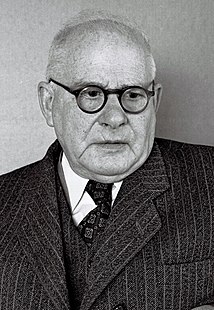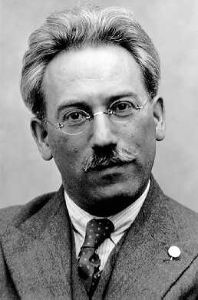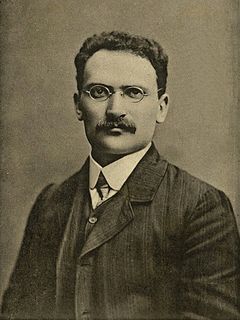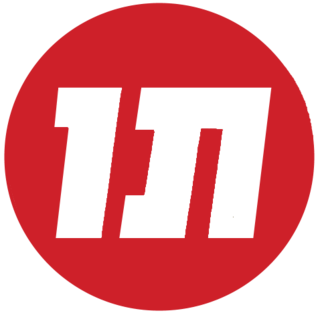Related Research Articles
A Yevsektsiya was a Jewish section of the Soviet Communist Party. These sections were established in fall of 1918 with consent of Vladimir Lenin to carry communist revolution to the Jewish masses. The Yevsektsiya published a Yiddish periodical, der Emes.
The Faction independent of Ahdut HaAvoda was a short-lived political party in Israel.
Jewish Communist Youth Union was the youth wing of the Jewish Communist Party in Russia. The first All-Russian convention of the organization took place 23–27 January 1920 in Moscow. The All-Russian conference of the organization took place 1–4 September 1920 in Kharkov.
Jewish Communist Party was a political party in Russia 1919-1922. The party was formed at a conference of communist dissident fractions of the Jewish Social Democratic Labour Party, held in Gomel August 10-15, 1919. Members of the party were nick-named 'EKOP-ists'. It was affiliated to the Jewish Communist Union.
The Jewish Social Democratic Labour Party was a Zionist socialist political party in the Russian Empire and Ukraine. The party was founded in 1906 in Poltava. Members of the party participated in the government of Ukraine in 1917-20. It was part of the international Poalei Zion movement. Due to its position towards the October Revolution and being a strong supporter of the Russian Constituent Assembly, the party was banned from most of Soviets dominated by the RSDLP(b), but was not recognized illegal until 1928.
There were two American Jewish organizations colloquially known as the Farband: the Communist-oriented Yidisher Kultur Farband and the Labor Zionist-oriented Yidish Natsionaler Arbeter Farband.
Mifleget Poale Zion VeHaHugim HaMarksistim beEretz Yisrael was the youth group of a faction of Poale Zion, the labour Zionist movement, in Mandate Palestine in the 1930s, which later merged into the Revolutionary Communist League. Tony Cliff, later the leader of the International Socialists, was a youthful member. It was linked to the Independent Labour Party in Britain, and affiliated to the London Bureau of socialist parties.
Jewish Communist Party may refer to:

Nahum Nir-Rafalkes was a Zionist activist, Israeli politician and one of the signatories of the Israeli declaration of independence. He was the only Speaker of the Knesset not to have been a member of the ruling party until Benny Gantz in 2020.
The Jewish Social Democratic Party "Poale Zion", later renamed Jewish Socialist Workers Party Poale Zion in German Austria in the fall of 1921 and Jewish Communist Party of Austria, was a political party in Austria. The party published Freie Tribune 1919-1921. The party was part of the international Jewish Communist Union, the left wing of the Labour Zionist Poale Zion movement.
Socialist Workers Party was a political party in the British Mandate of Palestine from 1919–1922. Its followers were known as Mopsim.
The Jewish Labour Movement (JLM), known as Poale Zion from 1903 to 2004, is one of the oldest socialist societies affiliated to the UK Labour Party.

Shlomo Kaplansky was a Labour Zionist politician, who served as the secretary of the World Union of Poalei Zion. During the 1920s he was a leading advocate of a bi-national state in Palestine. Kaplansky was the President of the Technion – Israel Institute of Technology.
The Jewish Communist Workers Youth Union , initially known as the Jewish Socialist Workers Youth Union (Russian: Evreĭskiĭ sotsialisticheskiĭ soiuz rabocheĭi molodezhi, was a Labour Zionist youth organization in Soviet Russia/Soviet Union. The organization was the youth wing of the Jewish Communist Labour Party. The All-Russian Constituent Conference of ESSRM was held March 4–10, 1921 in Moscow. This conference was followed by the first All-Russian Congress of ESSRM, held between August 15–20, 1922 in Moscow. The organization was active until 1928.
The Left Faction was a short-lived political party in Israel.

The Jewish left consists of Jews who identify with, or support, left-wing or liberal causes, consciously as Jews, either as individuals or through organizations. There is no one organization or movement which constitutes the Jewish left, however. Jews have been major forces in the history of the labor movement, the settlement house movement, the women's rights movement, anti-racist and anti-colonialist work, and anti-fascist and anti-capitalist organizations of many forms in Europe, the United States, Algeria, Iraq, Ethiopia, and modern-day Israel. Jews have a rich history of involvement in anarchism, socialism, Marxism, and Western liberalism. Although the expression "on the left" covers a range of politics, many well-known figures "on the left" have been of Jews who were born into Jewish families and have various degrees of connection to Jewish communities, Jewish culture, Jewish tradition, or the Jewish religion in its many variants.

Poale Zion was a movement of Marxist–Zionist Jewish workers founded in various cities of Poland, Europe and the Russian Empire in about the turn of the 20th century after the Bund rejected Zionism in 1901.

Dov Ber Borochov was a Marxist Zionist and one of the founders of the Labor Zionist movement. He was also a pioneer in the study of the Yiddish language.

The Kibbutz Movement is the largest settlement movement for kibbutzim in Israel. It was formed in 1999 by a partial merger of the United Kibbutz Movement and Kibbutz Artzi and is made up of approximately 230 kibbutzim. It does not include the Religious Kibbutz Movement with its 16 kibbutzim or the two Poalei Agudat Yisrael-affiliated religious kibbutzim.

Ahdut HaAvoda was the name used by a series of political parties. Ahdut HaAvoda in its first incarnation was led by David Ben-Gurion. It was first established during the period of British Mandate and later became part of the Israeli political establishment. It was one of the forerunners of the modern-day Israeli Labor Party.
References
- East European Jewish Affairs, Vol. 34, No. 2, Winter 2004, pp. 151–170
- ↑ Политические партии России: конец XIX - первая треть XX века. М., 1996.